Choosing the right type of CCTV camera is an essential part of the planning stage for your CCTV system. When well-specified, the right CCTV system can represent one of the most effective ways to fulfil your security requirements, and provide you with essential peace-of-mind.
Carefully chosen, the right camera can protect your building or business regardless of scale or complexity of your location, lighting condition(s), level of risk, whether you intend to monitor your cameras, as well as many other factors.
A visible CCTV camera can also act as a cost-effective visual deterrent against intrusion, and security footage can help with rapid response and recovery following an intrusion or theft.
With so many options on the market, and new CCTV technologies emerging all the time, it can be difficult to know how to choose the right camera for your application.
At Amthal, we have been designing, specifying, installing and maintaining video surveillance technologies to homes, residences and businesses for over 20 years. We wanted to share the expertise of our team of specialist qualified technicians to help you make the right choice of CCTV camera for your business or location.
Much more than just a CCTV equipment list, we will aim to explain each of the CCTV camera types, in terms of looks, functionality and image quality – and also in which conditions or applications the camera might be best used.
In this guide, we will cover:
- The main types of CCTV camera
- Benefits of each type of CCTV camera at-a-glance
- How to choose the right CCTV camera for you
- By budget
- By looks or aesthetics
- By wiring/cabling options
- By flexibility, range or image quality
So what are the different types of CCTV cameras? What type of CCTV camera is best for your building? Which type of CCTV camera will best protect your business?
Let’s get into it.
THE MAIN TYPES OF CCTV CAMERA
Bullet CCTV cameras
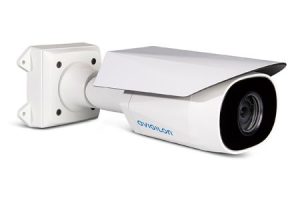
A bullet camera gets its name from its distinctive shape. Its cylindrical form is one of the most common types of CCTV camera that you’ll see around suburbs or small business locations, and probably the one that most of us would envisage when we think about a typical CCTV system nowadays.
Bullet cameras tend to be one of the most affordable options. This, along with easy installation and being suitable for both indoor and outdoor use, makes bullet cameras a popular choice. It’s also easily repositionable, meaning that you can conveniently adjust its field of view once installed, although this should also be noted for locations where tampering could cause an issue.
Bullet cameras tend to offer a good recording range, so are great for bigger expanses, such as long driveways. Most feature a casing which protects the lens from rain or dirt, making it perfect for outdoor settings, although it can also be used indoors. Many models also now have a night vision option.
Thanks to its recognisable shape, a bullet camera makes a particularly great visual deterrent. Many studies have suggested that if a CCTV camera is prominently visible on a property, that property is less likely to be broken into.
Dome CCTV Cameras
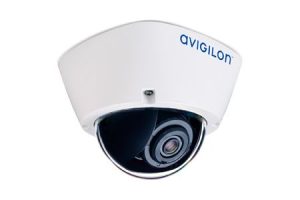
A dome camera is also named to reflect its shape – the camera is covered in a clear, protective dome. Dome cameras tend to be mounted on the ceiling, but some models have a tri-axis mount that allows the option of attaching it to the wall instead, which is great if you need to install your camera around wall or ceiling features, such as cornicing.
While many models are suitable for both indoor and outdoor use, a dome camera is a great option indoors when aesthetics are a priority. For example, a hotel or spa may want something a little less visually intrusive than a bullet camera within their facilities, to maintain a welcoming environment.
Dome cameras can also be more hardy than some other types of CCTV camera. This, as well as their tending to be mounted a little more out of reach, make dome cameras a good option for locations that could be subject to vandalism, for example, in common areas of mixed occupancy buildings, or on public property, such as a library or police station.
The main benefit of a dome camera is its rotating camera with a wide angle of vision. It is good for covering an expanse of space, rather than a ranged view, for example, a large hotel bar.
C-Mount CCTV Camera
If you’re looking for a big CCTV camera, this is the one for you. C-mount cameras – also known as ‘box cameras’ – tend to be larger, making for a clear visual deterrent. They tend to be used outside because of their bulky size, or in large, airy indoor environments, such as warehousing.
The ‘C-mount’ refers to the lens of the camera, which interestingly can also be found on 16mm film cameras. This means that a C-mount camera can cover a great range, and has interchangeable lenses so can be adjusted if your surveillance needs change.
They are extremely durable, with casing that protects it from the elements outdoors, or other challenging environments, such as cold climates in food production facilities.
The biggest benefit of the C-mount is its flexibility in terms of range and field of vision. A good application is a stretch of land in front of a property, making it a popular choice in industrial estates.
Pan, Tilt & Zoom (PTZ) CCTV cameras
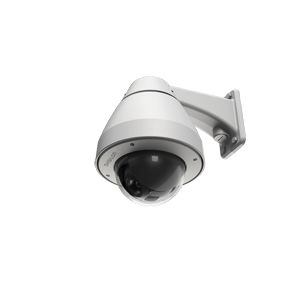
PTZ cameras are so-named for the movability of its field of vision – it can rotate through a 360-degrees and tilt up-and-down using its agile mount, and can zoom in-and-out with a varifocal lens.
The camera’s agile motion gives a higher degree of control over live imaging – so security personnel are able to zoom in if they need more detail on a situation before taking action, or pan around to a different area, for example, in a busy lobby.
Because of its ability to pan across a wide field of vision, a PTZ camera is a popular choice for large retail environments, for example, a clothing outlet. It can do the work of a number of cameras across a large space, so can be a cost-effective solution if you need to monitor an expansive area.
PTZ cameras tend to offer high image resolution, resulting in good detailed footage. This includes distinguishable facial features, which is useful in the event of a criminal investigation.
Day/Night CCTV cameras
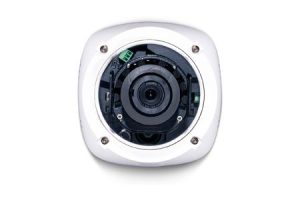
Day/night cameras are designed to function equally effectively across the lighting conditions of both daytime and night time, adapting through daylight, artificial light, and low lighting. They achieve this with more sensitive imaging chips. This is ideal when you need clear footage 24/7.
Despite adapting to lighting conditions, a day/night camera tends to capture good quality imaging, usually offering either black and white or colour.
These are good for outdoor use, especially as their casing design can protect the lens from the elements. An example application might be a loading bay which is subject to harsh glare during the day, is artificially lit during the evening, and is in low-lighting during periods of inactivity.
If a location is ever in total darkness, an IR camera should be considered instead.
Infrared (IR) or night vision CCTV cameras
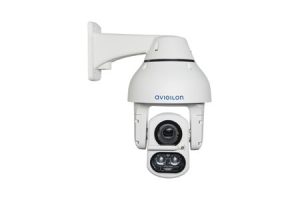
An infrared camera tends to be more expensive than a day/night camera, but is able to capture footage at night even in very dark conditions. It does this via the use of Infrared LED lights. With the same technology, it can capture footage even through mist or fog in the outdoors, and smoke or dust in an industrial environment.
An IR camera still captures footage during the day, by activating an infrared filter to record during hours of daylight.
This is a great option if you need reliable coverage even in the pitch black – for example, agricultural outbuildings or in banking vaults.
IP/Network CCTV cameras
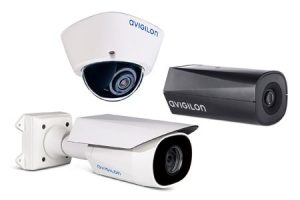
IP cameras – also known as network cameras – are digital cameras which stream footage through an internet connection. This makes it easy to view live footage, so an IP camera is a great option if business owners or building managers are often away from site or on-the-move, as they will have the ability to quickly and easily check-in.
IP cams can be standalone, wireless cameras, or can be connected to the internet via a wired connection. Even if you choose a wired option, installation is still relatively simple, as they do not require twin axial cabling.
As one of the most basic CCTV cameras, the non-wired option makes for one of the easiest CCTV cameras to install. This is ideal for areas that would suffer from any sort of downtime needed for CCTV installation, for example, a convenience store.
The lack of wiring also makes this a good option where maintaining the integrity of a building is a high priority, for example, in historic or religious buildings. Wireless cameras tend to come in more discreet options than other types of CCTV camera too, which is another boon for a setting where maintaining a certain look in the building is a high priority.
IP cameras, as well as being easy to install, tend to be low maintenance. With footage stored on NVRs (Network Video Recorders) or secure cloud software, there is no bulky control system to accommodate, and footage is easy to retrieve.
HD CCTV cameras
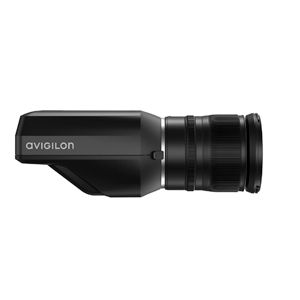
‘HD’ stands for high definition, so an HD camera naturally offers superior picture quality to its counterparts. Where other options can have some distortion in the image quality, HD cameras range from 720p to 4K imaging*.
This type of CCTV camera can be costlier, but is ideal in environments where a high level of detail will be integral to security considerations, for example, in casinos or banks.
*You might have heard this sort of phrase when looking at picture quality. Put simply, it refers to the number of horizontal pixels which make up a 16:9 picture; e.g. 720, 1080 or 4,000. The more lines, the crisper the imaging.
A note on definitions of CCTV cameras
There is no standard way to define types of CCTV camera, and there can be some crossover. For example, a bullet camera can also be an IP camera with IR night vision capabilities. This is where working with an expert to specify your cameras can really help.
BENEFITS OF EACH TYPE OF CCTV CAMERA AT-A-GLANCE
| Bullet cameras |
|
| Dome cameras |
|
| C-mount cameras |
|
| PTZ cameras |
|
| Day/night cameras |
|
| Infrared or night vision |
|
| IP, network, or wireless cameras |
|
| HD cameras |
|
HOW TO CHOOSE THE RIGHT CCTV CAMERA FOR YOUR BUSINESS OR BUILDING
When specifying a CCTV camera, we do a full site assessment at your specific location and take into account all the detailed factors that make up your security requirements. Here’s a few initial considerations to get you thinking:
Budget
Budget can be an important factor when choosing a CCTV camera. However, it’s not always the best use of budget to simply select the cheapest option. While wireless IP cameras tend to be the cheapest in terms of capital investment and installation, this will not be cost-effective if they are likely to be vandalised in your location. In high-security locations, such as banks or casinos, the most cost-effective option may actually be the most expensive models, such as a High-Definition CCTV camera.
Looks or aesthetics
As well as functionality, looks can be important when choosing your CCTV camera, especially in locations that need to maintain a particular aesthetic. This could be anything from a historic church right through to an ultra-modern luxury hotel. You may want to consider cameras that look less intrusive, such as a dome cam, or ones that require minimal installation, such as a wireless IP cam. In some locations, you might want to select a camera that is more conspicuous, but in-keeping with a modern design scheme; many models of bullet cameras can look particularly sleek. This might be the case in high-end retail, where you want the security to feel conspicuous but in-keeping with a luxury aesthetic.
Wiring and cabling options
Wiring and cabling isn’t only a consideration when it comes to your location’s aesthetics. You also need to think about impact on day-to-day operations if you choose a CCTV camera that has an intensive installation schedule. Then again, some downtime may be worth it if you need the additional quality or reliability of a fully-integrated CCTV system, such as a C-mount camera.
Flexibility, range and image quality
Do you need one camera to cover a broad space? Do you need an agile camera that can move around a large expanse? Do you need a static camera with a long range of vision? Do you need something that is going to offer crystal-clear detail? Thinking ahead about how you will use your CCTV system and how your needs might change can help in selecting the right CCTV camera from the start.
***
We hope this essential guide to CCTV cameras gives you a clear idea on the benefits that each type of CCTV camera offers, as well as some considerations about where they might work best (or where certain types might want to be avoided).
We’re always happy to talk about your specific needs when it comes to CCTV cameras. Want help choosing? Contact our expert team of qualified technicians and we can help guide you in selecting the best CCTV camera for your application.
